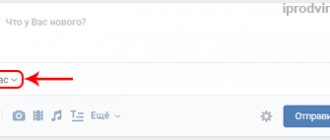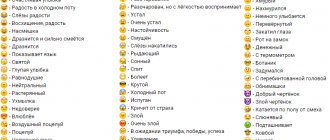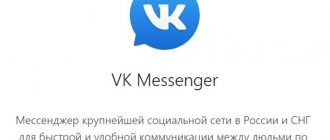It is no longer possible to imagine communication on social networks and instant messengers without emoticons. Emojis help us express our feelings and give the message the desired meaning. Sometimes one such symbol in the right place can say more than a word.
But do you know the meanings of all the emojis? Are you confident that you correctly interpret the messages sent to you by your interlocutor? Are you expressing your feelings to him correctly using emojis? Today, popular instant messengers and social networks use more than a hundred icons to express emotions. The meaning of yellow faces is clear without explanation - smile, sadness, aggression, laughter, and so on. But some other pictograms raise questions and require clarification.
In this article we will look at the meaning of the blue heart in VK. You will find out what your interlocutor wanted to convey to you, and you will understand in what cases you can send this emoji yourself. We will also tell you something else interesting about hearts.
My messages on VKontakte
How to find out if there are new (unread) VKontakte messages?
Do you want to find out about VKontakte messages without going there?
This is possible without you appearing online! Use the "Login" site. Connect your VK page (using the “Login” button) and go to this site at any time to see if you have new unread VKontakte messages. At the same time, you will not be online, as if you are not on the site (as if invisible). It also shows other VKontakte events (comments, likes, friend requests, tags in photos, etc.). Like this: And if you are already on the VKontakte website, then you will learn about new messages by the icon next to the “Messages” menu item. There will be a “plus” and a number indicating how many new messages you have - for example, +1 . Click on "Messages" and you will see them.
How to read a VKontakte message?
If you are already using the “Login” start page, then this is very simple. When you open it at VHOD.cc, it shows how many new messages you have (for example, “ Messages: 1 ”). Just click there and your messages will open right away. Unread ones will be highlighted with a pale blue background, and next to it will be written who sent them to you. Click on the message you want to read (there may be more than one message, but only the most recent one is shown first).
Is it possible to read a message without having it marked as read? Yes, there are some tricks:
What to do if VKontakte shows unread messages, but there are none?
The VKontakte website may show that you have unread messages (for example, +1 ), although there are none. It's just a glitch. Refresh the page completely (press the key combination Ctrl-F5) or clear temporary files (cache) of your browser.
Don't put a period at the end of a sentence on the Internet. Now we'll explain why ;-)
Photo: GETTY IMAGES Classic punctuation on the Internet does not work, and the period is perceived as a sign of rudeness or aggression. How did this happen? Good plan.
good plan
Good plan!!!11!
People interpret these sentences differently on social media, says Gretchen McCulloch, a linguist who specializes in the Internet.
“If you write a message to someone, then by default you break up each sentence, sending each message separately,”
says the specialist.
“The minimum necessary information is the message itself, and the rest is perceived as background that needs to be interpreted separately.”
According to a study from Binghamton University, students perceive messages ending with a period as less sincere than those without one.
In speech, a period is typically accompanied by a lowering of the voice to indicate the end of a sentence, and carries connotations of formality or seriousness, McCulloch explains.
“This can be good if the message you want to send is really serious.”
- she says.
“The problem comes when you have a positive message with a 'serious' period at the end. It's the juxtaposition of these things that creates this feeling of passive aggression."
- says the linguist.
In online correspondence, people usually send each sentence separately. That's why the period has acquired a new meaning, says Gretchen McCulloch. Illustration copyright: YVON HUYNH
So how can we tell if someone is truly annoyed or just using a period in the "traditional" sense?
Erica Darix, a linguist at Aston University in Birmingham, says it all depends on the context.
“If you don't usually use dots on WhatsApp and then someone does, they're probably trying to get their feelings across to you somehow,”
says Dr. Darix.
She says age and frequency of messaging use influence punctuation use.
Often these differences are more significant than cultural differences between countries.
Laziness or creativity?
The use of informal grammar and text slang when exchanging messages gives some “purists” a reason to accuse a person of laziness and failure to follow the rules of the language.
But McCulloch emphasizes that using slang or misspellings actually requires more effort in the age of autocorrect.
Messengers are also forcing people to come up with new ways to convey emotion and meaning without using body language or tone of voice.
“Back in the 16th century, it was proposed to introduce a typographic symbol to indicate irony, but it never took root. But over several years of being online, we came up with many ways to convey irony."
- notes teacher McCulloch.
Illustration copyright: GETTY IMAGES
For example, the acronym LOL (laugh out loud) can be used sarcastically, as can the upside down emoji.
“The same emoji can help us understand subtleties in other types of communication, such as political jargon.
This encourages creativity in the use of language,” says Aston University’s Darix.
Other linguists agree with her.
Speaking to the New Republic in 2013, Mark Lieberman, a professor of linguistics at the University of Pennsylvania, noted that his teenage son resents periods at the end of sentences.
“My messages seem overly aggressive or even rude because I end them with a period.”
- said the scientist.
Stressed adherence to the rules seems to create a feeling of arrogance, translator Elena Yanova suggested in correspondence with the BBC Russian Service.
Illustration copyright: GETTY IMAGES
Doctor of Philology, Professor of the Russian State University for the Humanities and the Higher School of Economics Maxim Krongauz believes that the period in online communication has become more than just the end of a sentence.
“The sign takes on an emotional coloring and can signal resentment or irritation,”
- the researcher is sure.
Teacher and linguist Maria Trubitsina believes that a message in the messenger has become a new unit of text for the language.
“If in a literary language we operate with sentences, and the element indicating their ending has a specific practical goal - ease of reading, then the message ending marker has no such goal, since messages are always structurally separated - for example, arranged in separate rectangles in a column. Therefore, the period at the end of the message, as an optional sign, acquires a new function,”
she shared her thoughts in a conversation with the BBC.
“Competing with emoji, text emoticons-brackets, the period becomes an indication of emphasized adherence to the norms of standard written language, which can be interpreted as severity, coldness or even rudeness.
In correspondence, we rely on the fact that we all have a common set of symbols to complete a message: emoji and parentheses, question mark, exclamation mark, period and nothing for an emphatically neutral tone. The choice is dictated by the emotion involved, and therefore the point is difficult to perceive as a simple adherence to the written tradition,” Trubitsina emphasizes.
How to write and send a message?
Go to the page of the person you want to write to (just click on their name). There will be a “Send Message” button. Click on it and write a message. You need to say hello and be polite. Then click "Send" and the message will be sent.
If there is no “Send message” button, it means that the person has allowed only some people to write to him. For example, only to friends. If you are not his friend, then in this case you will not be able to write a message. It may also turn out that he blocked you personally, if there were reasons for this.
As a recent study has shown, you can be rude to a person in correspondence via instant messengers or social networks simply by putting a period at the end of a short sentence. It turned out that punctuation on the Internet works completely differently from how it is taught in school. This is how a simple dot now began to be perceived as a sign of rudeness or aggression. The answer to this situation is given by linguists Gretchen McCulloch and Erica Darix.
“If you write a message to someone, then by default you break up each sentence, sending each message separately. This is the minimum necessary information - this is the message itself, and the rest is perceived as background that needs to be interpreted separately,” says Gretchen.
According to a study from Binghamton University, students perceive messages ending with a period as less sincere than those without one. But in ordinary speech, a period is usually accompanied by a lowering of the voice to indicate the end of a sentence, and carries connotations of formality or seriousness.
“If you put an end to it, it can be good if the message you want to send is really very serious. But problems arise when a dot appears at the end of your meaningfully positive messages. It is this opposition that creates the feeling of passive aggression,” says Gretchen.
In correspondence in instant messengers and social networks, people usually send each offer separately. Therefore, the period acquired a new meaning. So how can you tell if someone is truly annoyed or just using a full stop in the classic sense?
Erica Darix, a linguist at Aston University in Birmingham, says it all depends on the context, for example if a person doesn't usually use dots on WhatsApp and then does so, they're probably trying to convey their feelings in some way. Erica also noted that age and frequency of use of instant messengers affects the use of punctuation and often these differences are more significant than cultural characteristics between countries.
The use of informal grammar and text slang when exchanging messages gives some moralists a reason to accuse a person of laziness and non-compliance with the rules of language. But using slang or misspelling actually requires more effort in the age of autocorrect. Messengers are forcing people to come up with new ways to convey emotion and meaning without using body language or tone of voice. Emoticons and emojis can help us understand the subtleties of communication. But emphatic adherence to spelling rules creates a feeling of arrogance. So choose your style of communication in instant messengers that is close to your spirit, naturally observing the rules of good manners.
Photo preview / Nordwood Themes / unsplash.com
How to find out whether a person has read a VKontakte message or not?
Did the message get through? When you send a message to a person, first you see it on a pale blue, gray background (or a blue circle or blue dot next to it) - this means that the message has been sent, but the interlocutor has not yet read it. When he reads it, the pale blue background will disappear (that is, it will simply be on a white background).
Usually, until a person appears online, he will not read your message. However, if he receives copies of messages via email or mobile phone, it may turn out that in fact he has already read the text of the message, but you still see the message as unread.
This is what an unread message on VK looks like:
This is also unread, with a circle:
And this is the message read by the recipient, on a white background:
If you don’t see the difference and all your messages are on a white background - both read and unread - then the solution to the problem is here:
If a person is online, this does not mean that he will immediately read your message. He may notice that something has arrived, but he will decide for himself whether to read it or not. Maybe he has other things to do, he’s just reading the news feed and isn’t going to enter messages. Or maybe he saw that the message was from you and pretends that he didn’t notice.
The recipient of the message could also read the message and leave it “unread” if they used one of these methods:
The question often arises: why doesn’t a person respond to messages on VK? The point is that he doesn't have to answer you. Even if he read your message, he may want to remain silent. Therefore, you should not continue to flood your interlocutor with messages, he may simply block you and you will not be able to communicate with him at all.
So, when a person reads the message and whether he reads it at all depends only on him!
What do hearts mean in VK?
The list of VKontakte emojis contains as many as 17 hearts of different colors and shapes. In this way, you can express absolutely any feelings and emotions associated with love. To find hearts, in the message input field, click on the smiley icon and switch to the Emoji tab.
Scroll down the list of emojis until you see a block called "Symbols". Here, all the hearts are in first place, including the blue one.
VK has sorted out the blue heart. Let us now consider how other hearts can be interpreted and in what cases they can be used.
- - red color is traditional for this symbol, and it means strong love and passion. This emoji is used only in this context.











